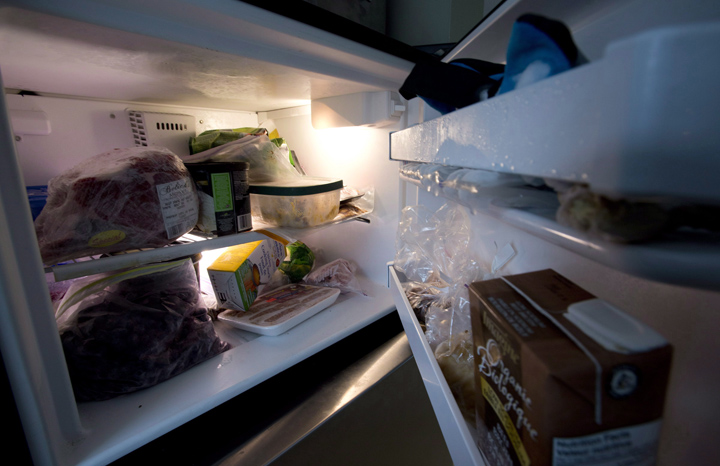TORONTO – Some 250,000 homes are still without power as thousands of people in Toronto clean up the mess the weekend ice storm left behind.

So what do you do with all of the food in your refrigerator and freezer? During a power outage, food could become unsafe to eat. Health officials offered up these tips to help you decide what to keep and what to toss.
READ MORE: No power until after Christmas for some: Toronto Hydro
– If you’ve lost power, keep your refrigerator door closed to maintain the cool temperature inside. Without power, the fridge section should keep foods cool for four to six hours, if the door is kept closed.
– Throw out perishable foods such as meat, fish, poultry, eggs and leftovers that have been at temperatures above 4C for more than two hours.
READ MORE: Ice storm grips Ontario, Quebec and Maritimes
– Keep your freezer door closed to maintain the temperature inside. A full freezer should keep food frozen for about two days if the door is kept closed.
– If the food in your freezer is thawing out, you can refreeze the food as long as they still contain ice crystals or are at 4C or below – evaluate your freezer’s contents separately.
- ‘Shock and disbelief’ after Manitoba school trustee’s Indigenous comments
- Canadian man dies during Texas Ironman event. His widow wants answers as to why
- Several baby products have been recalled by Health Canada. Here’s the list
- ‘Sciatica was gone’: hospital performs robot-assisted spinal surgery in Canadian first
– If possible, add bags of ice to the fridge or freezer to keep temperatures cooler for a longer period of time. If you return home and find the ice has melted, there’s a good chance the food might have spoiled.
READ MORE: Toronto not in state of emergency as hundreds or thousands remain without power
– If the food has come into contact with raw meat juices, throw it out. If you’re unsure, throw it out, too.
– Don’t use charcoal or gas barbecues, camping heating equipment or home generators indoors. They give off carbon monoxide that you can’t smell or see.
– If your fridge has been turned off for more than four hours, you’ll need to throw out: any raw or cooked meat, poultry or seafood; milk, cream, yogurt, soft and semi-soft cheese; cooked pastas, rice and potatoes, custards, casseroles, soups and stews, refrigerated cookie dough and cream-filled pastries; salads and eggs.
READ MORE: Alberta flooding: Health precautions to take when returning home
While city officials haven’t recommended it, some locals have taken to filling their coolers with ice, packing it with their frozen goods and storing the cooler outside in the cold. Right now, temperatures sit at below 0C with lows of -12C.
Read more from the City of Toronto here, and Health Canada’s tips here.
carmen.chai@globalnews.ca
Follow @Carmen_Chai




Comments